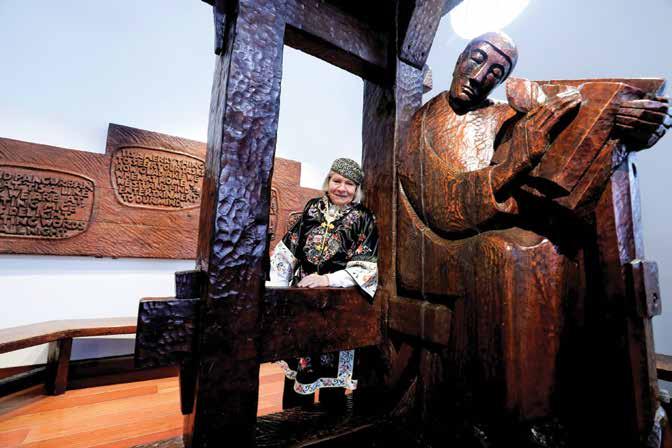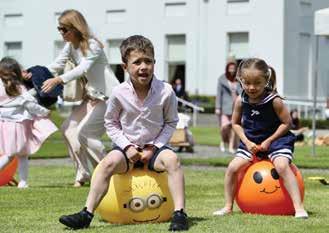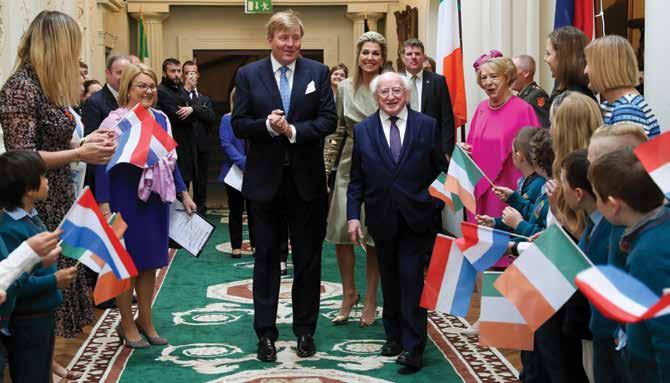
8 minute read
The Head of State
Welcoming King Willem-Alexander and Queen Máxima of the Netherlands during their State Visit to Ireland, June 2019
The Irish State is a republic and its Head of State is the President, who is elected directly by the people.
The Office of the President was established by the 1937 Constitution (Bunreacht na hÉireann) and the President’s role and powers are prescribed in the Constitution.
Along with Dáil Éireann and Seanad Éireann, the President forms part of the Oireachtas and has a legislative role to consider and sign bills passed by the Houses of the Oireachtas. The President also appoints the Taoiseach and members of the Government, judges and nominees to several senior public positions.
The President’s diplomatic role includes receiving foreign Heads of State and ambassadors, and undertaking visits abroad where the President represents Ireland at the highest level.
The President’s influence has important diplomatic benefits, strengthening Ireland’s influence at multilateral organisations such as the United Nations, but also economically, helping to open doors for Irish companies, academics and artists. On many of his visits abroad, the President works with bodies such as Enterprise Ireland, IDA Ireland, Culture Ireland and Tourism Ireland, to assist companies seeking new markets.
Representing the nation
In addition to performing his formal tasks, the President also plays an important role representing the entire Irish nation. As principal representative and leader of the country, the President not only personifies Ireland on the international stage but also symbolises Ireland’s identity, values, priorities and aspirations.
By speaking on behalf of the nation at times of national or international tragedy, or at times of celebration, the President can give voice to the feelings of the people of Ireland. Furthermore, by highlighting the work and achievements of people and organisations, the President can acknowledge important contributions to our society, and draw attention to specific themes or activities.
Greeting the Prince of Wales and Duchess of Cornwall at the Glencree Centre for Peace and Reconciliation, May 2019
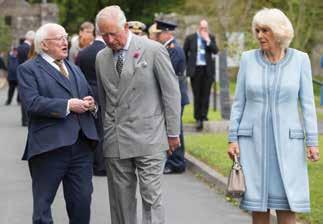

Welcoming Ambassadors to Áras an Uachtaráin, January 2019
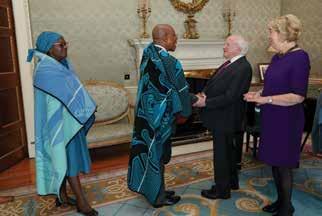
President Higgins delivered the prestigious Aristotle Address at the ancient Stoa in Athens, October 2019
At the invitation of President Pavlopoulos of Greece, President Higgins participated in the October 2019 meeting of the Arraiolos group of EU Heads of State, meeting in Athens.
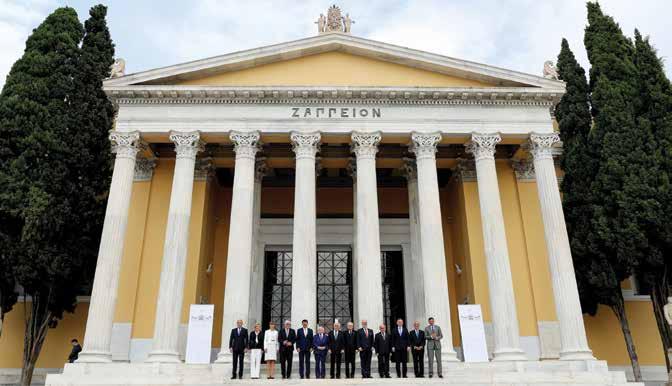
Highlighting achievements and special themes
Through his regular interaction with communities and organisations throughout Ireland, and through private meetings with a wide range of people, the President ensures he stays abreast of all kinds of developments in the country, and by hosting events at Áras an Uachtaráin the President can draw attention to the work of civic organisations or important social and cultural events.
President Higgins has structured this aspect of his work along a number of themes, combined in three special initiatives:
Participation and Transformation – Focusing on ways to change spaces and systems so that everyone in Ireland is encouraged and empowered to participate in processes that shape our future together.
Imagination and the Nation / Samhlaíocht agus
An Naisiún - Highlighting the importance of art and creativity in Irish life and celebrating its power to engage, challenge, transform and empower.
Shared Ireland, Shared Island – This initiative is aimed at sparking discussions on how we can all thrive on the island of Ireland, while living in harmony with respect for our complex history.
With some of the performers at the Fleadh Cheoil in Drogheda. President Higgins is a regular visitor, as well as the Patron, to the Fleadh Cheoil. Photo: Jenny Matthews
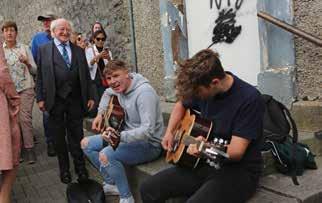
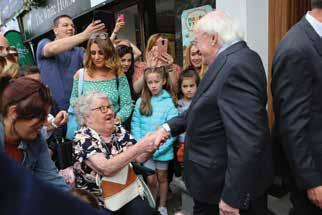
Meeting visitors to the Fleadh Cheoil, August 2019. Photo: Jenny Matthews
President Higgins thanking first responders, August 2019. Photo: Jenny Matthews

In offering a vision for the next seven years during the election, I spoke of a real Republic as being a life lived together, one where there is a commitment to equality, to strong sustainable communities, to the sharing of history and to shaping of the future together; recognising our vulnerabilities, drawing on and enhancing our individual and collective capacities.
Enrolment of the Constitution, November 2019
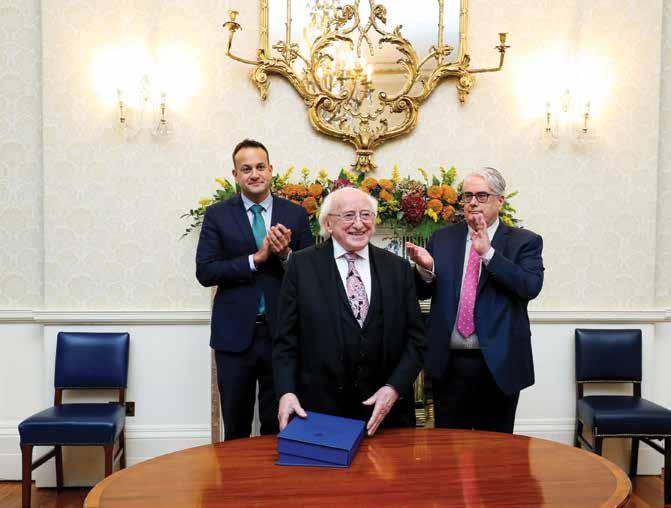
Legislation During 2019 President Higgins considered and signed 54 Bills into law.
The Houses of the Oireachtas (Dáil Éireann and Seanad Éireann) are responsible for passing legislation, but it is not until Bills are signed by the President that they become law.
The President’s role in this context is to consider whether Bills presented to him are compatible with the Constitution.
The President cannot veto a Bill simply because he doesn’t agree with its provisions, but where he has doubts over a Bill’s constitutionality, he can refer it to the Supreme Court to make a determination in this regard.
The President, having consulted with the Council of State, may decide to refer a Bill to the Supreme Court. If the Supreme Court finds that the Bill, or any part of it, is unconstitutional, the President declines to sign the Bill and it is not enacted. However, if the Court holds that the Bill is constitutional, the President signs the Bill and it becomes law. In this situation, under Article 34 of Bunreacht na hÉireann, the constitutionality of this legislation, or the provision of the bill that had been referred to the Supreme Court cannot be challenged at a later stage.
Though it has never happened, the Constitution provides that where disagreement exists between the Dáil and the Seanad, members of the Oireachtas may petition the President not to sign a Bill, on the grounds that it contains a proposal of such national importance that the will of the people should be sought, in the form of a referendum. Such a petition requires a majority of the Seanad and at least one third of the Dáil.
Bunreacht na hÉireann
In November 2019, President Higgins formally signed an updated version of the Constitution, reflecting the changes that have been made to it since 1999.
This was the 6th time in the history of the State that such an “Enrolment” took place. Under the terms of article 25.5 of Bunreacht na hÉireann, “from time to time” a new copy of the Constitution “authenticated by the signatures of the Taoiseach and the Chief Justice, shall be signed by the President and shall be enrolled for record in the office of the Registrar of the Supreme Court.” The Constitution states that “the copy so signed and enrolled which is for the time being the latest text so prepared shall, upon such enrolment, be conclusive evidence of this Constitution as at the date of such enrolment and shall for that purpose supersede all texts of this Constitution of which copies were so enrolled.”
Earlier such enrolments took place in 1938, 1942, 1980, 1990 and 1999.
Previous enrolments took place in 1938, 1942, 1980, 1990 and 1999.
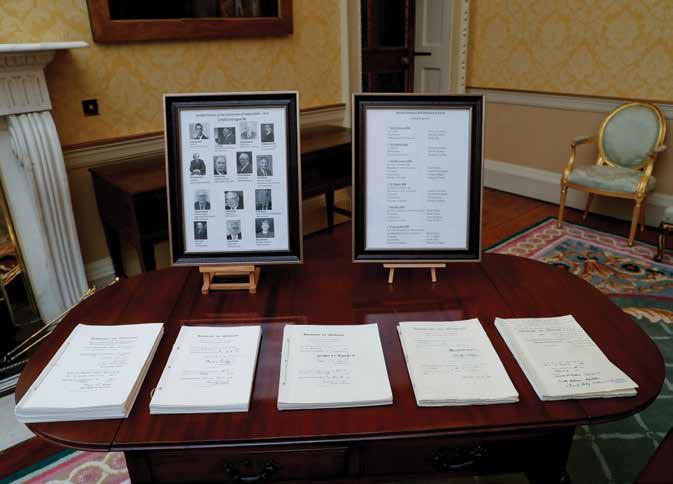
Council of State
In April 2019, President Higgins presented Warrants of Appointment of seven incoming members of the Council of State.
The Council of State is a body created by the Constitution, whose principal function is to advise the President.
Article 31 of the Constitution provides that ‘there shall be a Council of State to aid and counsel the President on all matters on which the President may consult the said Council in relation to the exercise and performance by him of such of his powers and functions as are conferred on the said Council by the Constitution.’
The Council is composed of the Taoiseach, Tánaiste, Chief Justice, President of the Court of Appeal, President of the High Court, the Ceann Comhairle, the Cathaoirleach of the Seanad, the Attorney General, former Presidents, Taoisigh and Chiefs Justice, and up to seven members appointed by the President.
The members appointed by President Higgins are:
Dr. Cara Augustenborg, environmental policy fellow and climate change advocate Ms. Sinéad Burke - academic, teacher, writer and inclusion advocate
Dr. Sindy Joyce – Human Rights defender and academic, and the first Mincéir in Ireland to graduate with a PhD Mr. Maurice Malone - CEO of the Birmingham Irish Association Dr Johnston McMaster - academic, theologian and lecturer in peace and reconciliation studies and social ethics. Dr. Mary Murphy - Associate Professor in Irish Politics and Society and equality activist. Mr. Seán Ó Cuirreáin - former journalist, broadcaster and Irish Language Commissioner.
Transformation and participation takes work, requires courage and determination. It is about how we engage and interact with each other, how we speak to each other in a way that is open yet respectful of difference.
Presidential Distinguished Service Awards for the Irish Abroad
President Higgins with the recipients of the Presidential Distinguished Service Awards, November 2019.
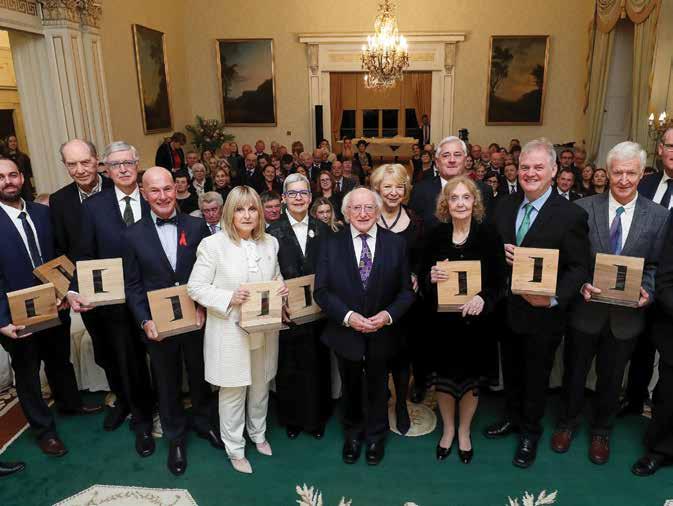
Each year, President Higgins presents the Presidential Distinguished Service Awards to a number of people who live outside Ireland and who have given exceptional service to this country or to Irish communities abroad.
The Awards were created in 2011 as a means to recognise the contribution of members of the Irish diaspora, and the first Awards were presented by President Michael D. Higgins in 2012.
The 2019 recipients were: Arts, Culture and Sport · Ian Gibson (Spain)
Charlotte Moore and Ciaran O’Reilly (USA)
Business and Education
· Paul Drechsler (Britain)
Michael Kenneally and Rhona Richman Kenneally (Canada)
Charitable Works
· Fr. Patrick Clarke (Brazil)
Bernard Lynch (Britain)
Irish Community Support
· Jackie Donohoe (USA)
Peace, Reconciliation and Development
· Sally O’Neill Sanchez (deceased - Honduras)
Science and Technology
· Jocelyn Bell Burnell (Britain)
William Howlett (Tanzania)
Throughout his term in office, President Higgins has emphasised the global nature of Ireland’s cultural heritage, the significance of the diaspora and the common history and identity we share “despite the borders, oceans and miles that may separate us”.


